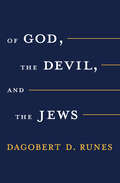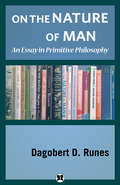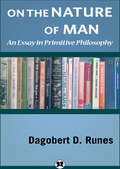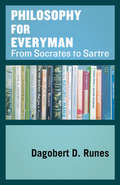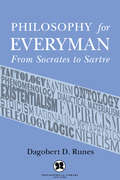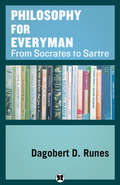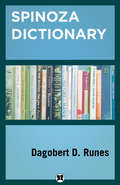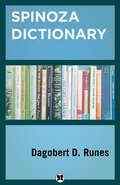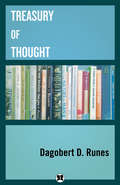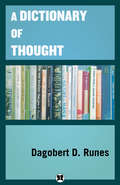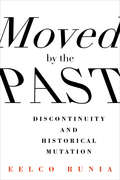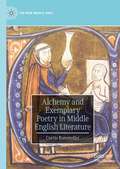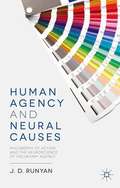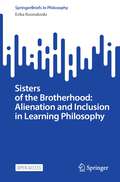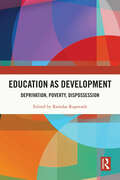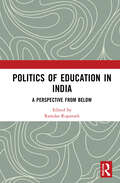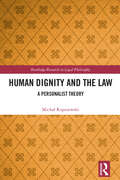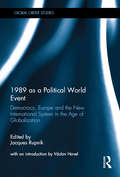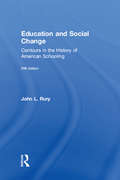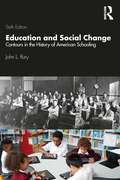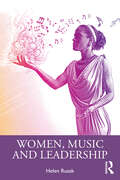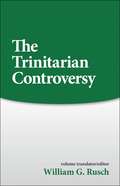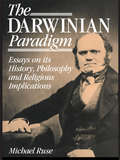- Table View
- List View
Handbook of Reason
by Dagobert D. RunesThe eminent philosopher presents a summation of his views on an encyclopedic range of topics from abstract art to Zionism.Culled from years of research and introspection, the diverse observations discussed in Handbook of Reason by Dagobert D. Runes are bound to stimulate, challenge, and at times force upon the reader a shock of recognition grounded in universal truths. In a style that moves from the aphoristic to the metaphorical, Runes offers countless gems of wisdom, often irresistibly quotable, and always profoundly moving. A humanitarian theme evolved partly from personal tragedies permeates his lifelong search for &“a life of God the Spirit and the Giver/(Of) God unbound and unencumbered/By hate or prejudice/A god to love by Deeds/Not hollow hymns and vows.&”
Of God the Devil and the Jews
by Dagobert D. RunesThe noted philosopher shares a far-ranging meditation on the necessity of faith and the many misuses of religion through history. In this volume, Dagobert D. Runes illuminates the history of Western culture in the light of Christian ethics. By exposing the lies and contradictions of the self-proclaimed followers and defenders of faith, he presents a profound indictment of the Western world, and a call to act in accord with our professed ideals. Speaking from his deep knowledge of history as well as religious and philosophical thought, Runes weaves a personal testament that is both emotionally powerful and intellectually rigorous.
On the Nature of Man
by Dagobert D. RunesThis insightful work, from the pen of the well-known philosopher, is offered as an attempt to define the borderlines of human thinking and human morality. Dr. Runes, in his search for verities and true humanity, takes the reader on an arduous voyage through the depths of the mind. This type of soul-searching philosophy, unburdened by traditional manner and terminology, is sometimes baffling, frequently of melancholy character, but almost always fascinating and inspiring.
On the Nature of Man: An Essay in Primitive Philosophy
by Dagobert D. RunesThis work of philosophical soul-searching explores the mysteries of human life and consciousness.In this fascinating work of spiritual philosophy, Dagobert D. Runes sets out on a contemplative journey unencumbered by the traditional manner and terminology of philosophical writing. His purpose here is to articulate the true essence of humanity and human thought. By turns inspiring and melancholy, Runes peels back the layers of quotidian life to explore its deepest meaning. As Runes puts it in this volume: &“What goes on in the core of our mind, this tumult created of our vexation with the business of animal living, lies just in our mind. Our mind is our whole world; the whole world is in our mind.&”
Philosophy for Everyman: From Socrates to Sartre
by Dagobert D. RunesThis sweeping history of philosophy by the author and founder of the Philosophical Library ranges from the pre-Socratics to existentialism. In this historical survey, Dagobert D. Runes introduces readers to the major developments in philosophical inquiry that began with the ancient Greeks. In clear and accessible prose, he traces the progression of thought through influential figures such as Jesus, Muhammad, Francis Bacon, and René Descartes. He also covers a chronology of movements from the Stoics and Epicureans to the Enlightenment, logical positivism, and existentialism. The founder and publisher of the Philosophical Library, Runes is both a philosopher and a scholar of philosophical history. In Philosophy for Everyman: From Socrates to Sartre, he carefully breaks down the key concepts of philosophy for the general reader.
Philosophy for Everyman
by Dagobert D. RunesPhilosopher Dagobert D. Runes introduces readers to the philosophical movements throughout the ages--traveling back to the time of the ancient Greeks all the way up to the twentieth-century with philosophies such as Existentialism--in this groundbreaking guide, Philosophy for Everyman from Socrates to Sartre. Readers will appreciate Runes's careful breakdown of concepts and his historical approach to philosophy. His engaging prose, written for the general reader, makes philosophy enjoyable and accessible. Dagobert D. Runes was a philosopher and author. He was the founding publisher of The Philosophical Library, where he worked to bring philosophical texts to a general audience. Runes was a colleague and friend of Albert Einstein and many other influential philosophers and scientists. Runes is responsible for publishing an English translation of Marx's On the Jewish Question, which he published under the title A World without Jews, and for editing The Dictionary of Philosophy, published in 1942.
Philosophy for Everyman from Socrates to Sartre
by Dagobert D. RunesPhilosopher Dagobert D. Runes introduces readers to the philosophical movements throughout the ages--traveling back to the time of the ancient Greeks, all the way up to the twentieth century, with philosophies such as Existentialism--in this groundbreaking guide, Philosophy for Everyman from Socrates to Sartre. Readers will appreciate Runes' careful breakdown of concepts and his historical approach to philosophy. His engaging prose, written for the general reader, makes philosophy enjoyable and accessible.
Spinoza Dictionary
by Dagobert D. RunesIn this work, Baruch Spinoza, one of the cardinal thinkers of all times, answers the eternal questions of man and his passions, and God and nature. In the deepest sense, this dictionary of Spinoza's philosophy is a veritable treasury of sublime wisdom. In his introduction, Dagobert D. Runes, a life-long student of the philosopher, sheds new light on Spinoza's private, political and religious life, and exposes and explains the dramatic story of his apostasy. If the reader despairs of the business of finding his way through Spinoza's works, here he will find a reliable guide speaking in Spinoza's own words. "The grand ideas of Spinoza's Ethics are brought out clearly in this book: not less than the heroic illusions of this great and passionate man." --Albert Einstein
Spinoza Dictionary
by Dagobert D. RunesThis A-to-Z reference volume presents definitions, propositions, and explanations of Spinoza&’s thought—all in the philosopher&’s own words. The seventeenth-century philosopher Baruch Spinoza remains one of the most significant thinkers of our time. Yet his works, written in a rigidly geometric form of argumentation, are notoriously difficult to navigate. Expertly edited by Dagobert D. Runes, Spinoza Dictionary presents an alphabetical selection of Spinoza&’s own writings, making essential definitions, concepts, and passages immediately accessible. In his introduction, Runes sheds new light on Spinoza&’s private, political, and religious life, and exposes and explains the dramatic story of his apostasy. If the reader despairs of finding his way through Spinoza&’s works, here he will find a reliable guide speaking in Spinoza&’s own words. &“The grand ideas of Spinoza&’s Ethics are brought out clearly in this book: not less than the heroic illusions of this great and passionate man.&” —Albert Einstein
Treasury of Philosophy
by Dagobert D. Runes"Treasury of Philosophy" is a catalog of famous and not so well-known philosophers the world over. Includes Hebrew, Chinese, European and North American as well as other Oriental Philosophers.
Treasury of Thought
by Dagobert D. RunesThis volume is truly and doubly a &“Treasury.&” With its easy to read structure of brief entries in alphabetic order, it is a treasure house of observations on life and death, civilization and savagery, the universe and beyond—the Great Topics which have challenged man&’s thought, whether in passionate public debate or in the lonely stillness of his nights, ever since he first raised his eyes to the stars. At the same time, this is a &“personal treasury&” of the intimate thoughts of an outstanding modern philosopher on these Great Topics.
A Dictionary of Thought
by Dagobert D. Runes Karl MarxThis dictionary, from the pen of the well-known philosopher Dagobert D. Runes, is offered as an attempt to define the borderlines of human thinking and human morality. In 152 pages organized alphabetically, Dr. Runes has created a dictionary of his own philosophical musings indexed by evocative words. Each word is followed by up to several single sentence aphorisms and occasionally a short essay. As a collection, they cover an extremely broad range of topics. In his search for real verities and true humanity, he takes the reader on an arduous thought-provoking voyage through the depths of the mind. This type of soul-searching philosophy, unburdened by traditional manner and terminology, is sometimes baffling, frequently of melancholy character, but almost always fascinating and inspiring.
Moved by the Past: Discontinuity and Historical Mutation (European Perspectives: A Series in Social Thought and Cultural Criticism)
by Eelco RuniaHistorians go to great lengths to avoid confronting discontinuity, searching for explanations as to why such events as the fall of the Berlin Wall, George W. Bush's invasion of Iraq, and the introduction of the euro logically develop from what came before. Moved by the Past radically breaks with this tradition of predating the past, incites us to fully acknowledge the discontinuous nature of discontinuities, and proposes to use the fact that history is propelled by unforeseeable leaps and bounds as a starting point for a truly evolutionary conception of history. Integrating research from a variety of disciplines, Eelco Runia identifies two modes of being "moved by the past": regressive and revolutionary. In the regressive mode, the past may either overwhelm us—as in nostalgia—or provoke us to act out what we believe to be solidly dead. When we are moved by the past in a revolutionary sense, we may be said to embody history: we burn our bridges behind us and create accomplished facts we have no choice but to live up to. In the final thesis of Moved by the Past, humans energize their own evolution by habitually creating situations ("catastrophes" or sublime historical events) that put a premium on mutations. This book therefore illuminates how every now and then we chase ourselves away from what we were and force ourselves to become what we are. Proposing a simple yet radical change in perspective, Runia profoundly reorients how we think and theorize about history.
Alchemy and Exemplary Poetry in Middle English Literature (The New Middle Ages)
by Curtis RunstedlerThis book explores the different functions and metaphorical concepts of alchemy in fourteenth- and fifteenth-century Middle English poetry and bridges them together with the exempla tradition in late medieval English literature. Such poetic narratives function as exemplary models which directly address the ambiguity of medieval English alchemical practice. This book examines the foundation of this relationship between alchemical narrative and exemplum in the poetry of Gower and Chaucer in the fourteenth century before exploring its diffusion in lesser-known anonymous poems and recipes in the fifteenth century, namely alchemical dialogues between Morienus and Merlin, Albertus Magnus and the Queen of Elves, and an alchemical version of John Lydgate’s poem The Churl and the Bird. It investigates how this exemplarity can be read as inherent to understanding poetic narratives containing alchemy, as well as enabling the reader to reassess the understanding and expectations of science and narrative within medieval English poetry.
Human Agency and Neural Causes: Philosophy of Action and the Neuroscience of Voluntary Agency
by J. D. RunyanHuman Agency and Neural Causes provides an analysis of our everyday thought about our conduct, and the neuroscience research concerning voluntary agency. J.D. Runyan argues that our findings through neuroscience are consistent with what would be expected if we are, in fact, voluntary agents.
Sisters of the Brotherhood: Alienation and Inclusion in Learning Philosophy (SpringerBriefs in Philosophy)
by Erika RuonakoskiThis open access book explores the gendered reality of learning philosophy at the university level, investigating the ways in which women and minority students become alienated from the social practices of a male-dominated field, and examining pedagogical solutions to this problem. It covers the roles and the interactions of the professor and student in the following ways: (1) the historical situation, (2) the affective, social and bodily situation, and (3) the moral situation. This text analyzes women’s passion for philosophy as a quest for truth, as well as their partial alienation from the social practices of philosophy. It demonstrates that recognition, generosity, and care are central ingredients of good learning and teaching experiences. Providing case studies of experimental courses in philosophy, the book discusses a variety of pedagogical approaches that might increase the inclusiveness of a philosophical education: novel and more gender-balanced ways of interpreting the history of philosophy, problem-based learning as a means of emancipating the student from the traditional master–disciple relationship, body awareness practices as a way of challenging the “disembodying” tendencies of philosophy, and a pluralism of methods to address the needs of different kinds of learners. Thanks to these features, the book is particularly useful for philosophy professors at the university level, but it also provides insights for all readers who feel puzzled about the persistent underrepresentation of women in philosophy.
Education as Development: Deprivation, Poverty, Dispossession
by Ramdas RupavathThis book is an in-depth analysis of the educational development of tribals in India. Education as Development: Deprivation, Poverty, Dispossession is a significant new addition for understanding educational and economic setbacks experienced by the marginalized in India. The volume:• Focuses on how the social, economic and education systems have evolved over time in India and identifies the scope of development in these areas;• Provides a rational structure for readers to understand how the Adivasi in India can be made to fit in the modern designed education system;• Highlights the problems of the marginalized – such as income inequality, education, health, housing, governance, civil society environment and infrastructure and others which hampers their overall growth. This book will be of great interest to students and researchers and policy makers in the fields of education, minority studies, indigenous studies, sociology of education, and South Asian studies.
Politics of Education in India: A Perspective from Below
by Ramdas RupavathThis book studies the state of tribal education in India. India has the single largest tribal population in the world, yet the tribal community remains one of the most economically impoverished and marginalized groups in the country. The volume • Examines the educational status of the tribal population and studies developmental issues such as unemployment, illiteracy, caste discrimination, and inequality faced by the community. • Studies the implementation and execution of welfare schemes, initiatives, and reforms in place to tackle issues faced by tribal students and identifies loopholes in the various centrally sponsored schemes. • Emphasizes the importance of the Right to Education Act and presents policy implications for the educational uplift of India’s very many millions of tribal people. A critical study of the Indian education system, this book will be indispensable to students and researchers of education, education policy, minority studies, indigenous studies, sociology of education, and South Asian studies.
Human Dignity and the Law: A Personalist Theory (Routledge Research in Legal Philosophy)
by Michał RupniewskiThis book reassesses the relationship between human dignity, law, and specifically the ‘personalist’ school of agency. The work argues that a specific way of appreciating dignity is contained in how law understands the person, and so can be used to improve upon how we explain and interpret the law. Despite considerable differences between jurisdictions as regards human dignity in application, it is argued that the particular weight of human persons is the widely shared focal point. The central claim, therefore, is that the law recognises, and tries to foster, the status of personhood, and, drawing on the work of Karol Wojtyła, the author develops a ‘Status of Personhood Theory’. The book will be of interest to academics and researchers working in the areas of Legal Philosophy, Jurisprudence, Philosophy, Ethics and Political Theory.
1989 as a Political World Event: Democracy, Europe and the New International System in the Age of Globalization (Global Order Studies)
by Jacques RupnikThis book is not about the events of 1989, but about 1989 as a world event. Starting with the fall of the Berlin Wall and the collapse of the Soviet bloc it examines the historical significance and the world brought about by 1989. When the Cold War ended in Europe it ushered in a world in which the international agenda is set outside Europe, in America or Asia. The book critically examines and moves beyond some of the conveniently simple paradigms proposed in the nineties, by leading political scientists such as Fukuyama and Huntington, to show how the events of 1989 meant different things to different parties. This was an anti-utopian revolution, a symbol of the possibility of non-violent transitions to democracy, which raised the hopes of world-wide democratic changes. Contributors show how 1989 can be seen as the founding moment of a globalized world, but equal attention should be given to the dispersion of its meanings and the exhaustion of some of its main trends associated with the post-1989 era. Europe was reunited, yet it is in crisis. Twenty years on, global markets have brought about a global financial crisis. The fall of the Berlin Wall was celebrated as the advent of free movement in a world without borders. Now however, we can see that new borders, walls, fences have since been built. With an introductory essay by Vaclav Havel, 1989 as a Political World Event will be of interest to scholars of European Politics and International Relations.
Education and Social Change
by John L. RuryThis brief, interpretive history of American schooling focuses on the evolving relationship between education and social change. Like its predecessors, this new edition investigates the impact of social forces such as industrialization, urbanization, immigration and cultural conflict on the development of schools and other educational institutions. It also examines the various ways that schools have contributed to social change, particularly in enhancing the status and accomplishments of certain social groups and not others. Detailed accounts of the experiences of women and minority groups in American history consider how their lives have been affected by education. Changes in this new edition include the following: A more thorough treatment of key concepts such as globalization, human capital, social capital, and cultural capital. Enhanced attention to issues of diversity throughout. Greater thematic coherence as a result of dividing chapter 6 into two chapters, the first focusing on the postwar period and emphasizing the themes of equity and social justice and the second focusing on human capital in education, highlighting the standards movement, federal policy changes and neo-liberal reform. A revision of several focal point discussions for greater clarity and thematic releance. Update discussions of recent changes in educational politics, finance and policy, especially the troubles presently facing No Child Left Behind (NCLB).
Education and Social Change: Contours in the History of American Schooling
by John L. RuryThis brief, interpretive history of American schooling focuses on the evolving relationship between education and social change. Like its predecessors, this new edition investigates the impact of social forces such as industrialization, urbanization, immigration, and cultural conflict on the development of schools and other educational institutions. It also examines the various ways that schools have contributed to social change, particularly in enhancing the status and accomplishments of certain social groups and not others. Detailed accounts of the experiences of women and minority groups in American history consider how their lives have been affected by education at key points in the past. Updates to this edition A revised final chapter updated to include recent changes in educational politics, finance, policy, and a shifting federal policy context Enhanced coverage and new conceptual frames for understanding the experiences of women and people of color in the midst of social change Edited throughout to update information and sources regarding the history of American education and related processes of social transformation in the nation’s past
Women, Music and Leadership
by Helen RusakWomen, Music and Leadership offers a wide-ranging survey of women in musical leadership and their experiences, highlighting women’s achievements and considering how they negotiate the challenges of the leadership space in music. Women have always participated in music as performers, teachers, composers and professionals, but remain underrepresented in leadership positions. Covering women’s leadership across a wide variety of roles and musical genres, this book addresses women in classical music, gospel, blues, jazz, popular music, electronic music and non-Western musical contexts, and considers women working as composers, as conductors, and in music management and the music business. Each chapter includes several case studies of women’s careers, exploring their groundbreaking contributions to music and the challenges they faced as leaders. Connecting management theory and leadership research with feminist musicology, this book paints a new picture of women’s major contributions as leaders in music and their ongoing struggles for equity. It will be relevant to students and scholars in arts and music management, as well as all those studying music, gender or leadership, and women music professionals.
The Trinitarian Controversy
by William G. RuschThe purpose of this series is to allow an English-reading public to gain firsthand insights into these significant times for Christianity by making available in a modern, readable English the fundamental sources which chronicle how Christianity and its theology attained their normative character. This volume explores the development of the doctrine of the Trinity in the patristic church as a result of the Arian controversy:Arius -- Letter to Eusebius of Nicomedia Arius -- Letter to Alexander of Alexandria Alexander of Alexandria -- Letter to Alexander of Thessalonica The Synodal Letter of the Council of Antioch, A. D. 325 The Creed of the Synod of Nicaea (June 19, 325) The Canons of Nicaea, A. D. 325 Eusebius of Caesarea -- Letter to His Church concerning the Synod at Nicaea Arius -- Letter to the Emperor Constantine Athanasius -- Orations against the Arians, Book 1 Gregory of Nazianzus -- Third Theological Oration concerning the Son Gregory of Nyssa -- Concerning We Should Think of Saying That There Are Not Three Gods to Ablabius Augustine of Hippo -- On the Trinity, Book 9
The Darwinian Paradigm: Essays On Its History, Philosophy, And Religious Implications
by Michael RuseFirst published in 1989. Routledge is an imprint of Taylor & Francis, an informa company.

